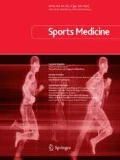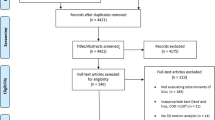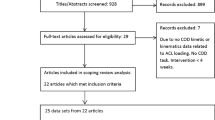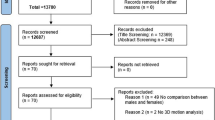Abstract
Background
Knee joint mechanics during sidestepping are associated with anterior cruciate ligament injury. Unplanned sidestepping more closely emulates game scenarios when compared with planned sidestepping by limiting decision time, increasing knee loading and challenging the integrity of soft-tissue structures in the knee. It is important to quantify the loads that may challenge the integrity of the knee during planned and unplanned sidestepping.
Objective
Our objective was to review literature on knee mechanics during planned and unplanned phases of sidestepping.
Data sources
PubMed, CINAHL, MEDLINE (EBSCO), SPORTDiscus and Web of Science were searched using the terms knee mechanics OR knee kine*, AND plan*, unplan*, anticipat*, unanticipat*, side*, cut* or chang*.
Study selection
A systematic approach was used to evaluate 4,629 records. Records were excluded when not available in English, only available in abstract of conference proceedings, not involving a change-of-direction sidestep, not comparing planned and unplanned or maintaining a running velocity greater than 2 m s−1.
Data extraction
Included studies were evaluated independently by two authors using a custom-designed methodological quality assessment derived from the Physiotherapy Evidence Database (PEDro) scale and then confirmed by a third author.
Data synthesis
Only six studies met the inclusion criteria and were retained for meta-analysis. Magnitude-based inferences were used to assess the standardised effect of the differences between planned and unplanned sidestepping. Knee angles and knee moments were extracted and reported for flexion/extension, abduction/adduction and internal/external rotation for initial contact, weight acceptance, peak push-off and final push-off phases of sidestepping.
Results
For kinematic variables, unplanned sidestepping produced a wide range of small to large increases in knee extension angles, small and moderate increases in knee abduction angles and a small increase in internal rotation angle relative to planned sidestepping during the sidestepping manoeuvre. For kinetic variables, unplanned sidestepping produced mostly small (small to large) increases in knee flexor moments, small to moderate increases in knee abductor moments and mostly moderate (small to large) increases in internal rotator moments relative to planned sidestepping.
Limitations
Approach velocity constraints during the sidestepping manoeuvre were lifted due to the low number of eligible studies. The varying approach velocities included (ranging from 3.0 to 5.5 m s−1) may impact the kinematic and kinetic variables examined in this review.
Conclusions
Differences in knee mechanics between planned and unplanned sidestepping exist. The most substantial effects occurred during the weight acceptance phase of sidestepping. It seems that biomechanical factors commonly associated with anterior cruciate ligament injury risk are affected the most during the loading phase compared with peak push-off; made evident in the coronal (abductor) and transverse (internal rotator) knee kinetic data presented in this review. The authors of this review propose a rationale for the incorporation of unplanned sport tasks in the development of anterior cruciate ligament injury screening and in prophylactic training programmes.


Similar content being viewed by others
References
Hootman JM, Dick R, Agel J. Epidemiology of collegiate injuries for 15 sports: summary and recommendations for injury prevention initiatives. J Athl Train. 2007;42(2):311–9.
Peterson L, Junge A, Chomiak J, et al. Incidence of football injuries and complaints in different age groups and skill-level groups. Am J Sports Med. 2000;28(5 Suppl):S51–7.
Brooks JHM, Fuller CW, Kemp SPT, et al. Epidemiology of injuries in English professional rugby union: Part 1 match injuries. Br J Sports Med. 2005;39(10):757–66.
Garraway M, Macleod D. Epidemiology of rugby football injuries. Lancet. 1995;345(8963):1485–7.
King DA, Hume PA, Milburn P, et al. Rugby league injuries in New Zealand: a review of 8 years of Accident Compensation Corporation injury entitlement claims and costs. Br J Sports Med. 2009;43(8):595–602.
Turner AP, Barlow JH, Heathcote-Elliott C. Long term health impact of playing professional football in the United Kingdom. Br J Sports Med. 2000;34(5):332–6.
Cochrane JL, Lloyd DG, Buttfield A, et al. Characteristics of anterior cruciate ligament injuries in Australian football. J Sci Med Sport. 2007;10(2):96–104.
Donnelly CJ, Elliott BC, Ackland TR, et al. An anterior cruciate ligament injury prevention framework: incorporating the recent evidence. Res Sports Med. 2012;20(3–4):239–62.
Crichton KJ. Common knee problems in sport: their assessment, management and prevention. Australia: Australian Sports Medicine Federation and Syntex Australia Limited; 1989.
Li G, Rudy TW, Sakane M, et al. The importance of quadriceps and hamstring muscle loading on knee kinematics and in-situ forces in the ACL. J Biomech. 1999;32(4):395–400.
Hutson MA. Sports injuries: recognition and management. 3rd ed. Oxford: Oxford University Press; 2001.
Starkey C, Brown SD, Ryan JL. Examination of orthopedic and athletic injuries. 3rd ed. Philadelphia: F.A. Davis Company; 2009.
Markolf KL, Burchfield DM, Shapiro MM, et al. Combined knee loading states that generate high anterior cruciate ligament forces. J Orthop Res. 1995;13(6):930–5.
McLean SG, Huang X, van den Bogert AJ. Association between lower extremity posture at contact and peak knee valgus moment during sidestepping: implications for ACL injury. Clin Biomech. 2005;20(8):863–70.
Markolf KL, Gorek JF, Kabo JM, et al. Direct measurement of resultant forces in the anterior cruciate ligament. An in vitro study performed with a new experimental technique. J Bone Joint Surg. 1990;72(4):557–67.
McLean SG, Huang X, Su A, et al. Sagittal plane biomechanics cannot injure the ACL during sidestep cutting. Clin Biomech. 2004;19(8):828–38.
Woo SL-Y, Hollis JM, Adams DJ, et al. Tensile properties of the human femur-anterior cruciate ligament-tibia complex: The effects of specimen age and orientation. Am J Sports Med. 1991;19(3):217–25.
Van den Bogert AJ, McLean SG. Keynote address I. ACL injuries: do we know the mechanisms? J Orthop Sports Phys Ther. 2007;37(2):A8–9.
Nordin M, Frankel VH. Basic biomechanics of the musculoskeletal system. 4th ed. Baltimore: Lippincott Williams & Wilkins; 2012.
Agel J, Evans TA, Dick R, et al. Descriptive epidemiology of collegiate men’s soccer injuries: National Collegiate Athletic Association Injury Surveillance System, 1988–1989 through 2002–2003. J Athl Train. 2007;42(2):270–7.
Anderson SJ, Griesemer BA, Johnson MD, et al. Injuries in youth soccer: a subject review. Pediatrics. 2000;105(3):659–61.
Árnason Á, Gudmundsson Á, Dahl HA, et al. Soccer injuries in Iceland. Scand J Med Sci Sports. 1996;6(1):40–5.
Dick R, Putukian M, Agel J, et al. Descriptive epidemiology of collegiate women’s soccer injuries: National Collegiate Athletic Association Injury Surveillance System, 1988–1989 through 2002–2003. J Athl Train. 2007;42(2):278–85.
Dallalana RJ, Brooks JHM, Kemp SPT, et al. The epidemiology of knee injuries in English professional rugby union. Am J Sports Med. 2007;35(5):818–30.
Koga H, Nakamae A, Shima Y, et al. Mechanisms for noncontact anterior cruciate ligament injuries: knee joint kinematics in 10 injury situations from female team handball and basketball. Am J Sports Med. 2010;38(11):2218–25.
Olsen O-E, Myklebust G, Engebretsen L, et al. Injury mechanisms for anterior cruciate ligament injuries in team handball: a systematic video analysis. Am J Sports Med. 2004;32(4):1002–12.
Mihata LCS, Baeautler AL, Boden BP. Comparing the incidence of anterior cruciate ligament injury in collegiate lacrosse, soccer, and basketball players: implications for anterior cruciate ligament mechanism and prevention. Am J Sports Med. 2006;34(6):445–55.
Besier TF, Lloyd DG, Cochrane JL, et al. External loading of the knee joint during running and cutting maneuvers. Med Sci Sports Exerc. 2001;33(7):1168–75.
Boden BP, Dean GS, Feagin JA Jr, et al. Mechanisms of anterior cruciate ligament injury. Orthopedics. 2000;23(6):573–8.
McNair PJ, Marshall RN, Matheson JA. Important features associated with acute anterior cruciate ligament injury. N Z Med J. 1990;103(901):537–9.
Noyes FR, Mooar PA, Matthews DS, et al. The symptomatic anterior cruciate-deficient knee. Part I: the long-term functional disability in athletically active individuals. J Bone Joint Surg Am. 1983;65(2):154–62.
Brophy RH, Silvers HJ, Gonzales T, et al. Gender influences: the role of leg dominance in ACL injury among soccer players. Br J Sports Med. 2010;44(10):694–7.
Ferretti A, Papandrea P, Conteduca F, et al. Knee ligament injuries in volleyball players. Am J Sports Med. 1992;20(2):203–7.
Faunø P, Jakobsen BW. Mechanism of anterior cruciate ligament injuries in soccer. Int J Sports Med. 2006;27(1):75–9.
Feagin JA Jr, Lambert KL. Mechanism of injury and pathology of anterior cruciate ligament injuries. Orthop Clin North Am. 1985;16(1):41–5.
Alentorn-Geli E, Myer GD, Silvers HJ et al. Prevention of non-contact anterior cruciate ligament injuries in soccer players. Part 1: mechanisms of injury and underlying risk factors. Knee Surg Sports Traumatol Arthrosc. 2009;17(7):705–29.
Boden BP, Griffin LY, Garrett WE Jr. Etiology and prevention of noncontact ACL injury. Physician Sportsmed. 2000;28(4):53–60.
Ryder SH, Johnson RJ, Beynnon BD, et al. Prevention of ACL injuries. J Sport Rehabil. 1997;6(2):80–96.
Cross MJ, Gibbs NJ, Bryant GJ. An analysis of the sidestep cutting manoeuvre. Am J Sports Med. 1989;17(3):363–6.
Kimura Y, Ishibashi Y, Tsuda E, et al. Mechanisms for anterior cruciate ligament injuries in badminton. Br J Sports Med. 2010;44(15):1124–7.
Vanrenterghem J, Venables E, Pataky T, et al. The effect of running speed on knee mechanical loading in females during side cutting. J Biomech. 2012;45(14):2444–9.
Sigward SM, Powers CM. The influence of gender on knee kinematics, kinetics and muscle activation patterns during side-step cutting. Clin Biomech. 2006;21(1):41–8.
Dempsey AR, Lloyd DG, Elliott BC, et al. Changing sidestep cutting technique reduces knee valgus loading. Am J Sports Med. 2009;37(11):2194–200.
Imwalle LE, Myer GD, Ford KR, et al. Relationship between hip and knee kinematics in athletic women during cutting maneuvers: a possible link to noncontact anterior cruciate ligament injury and prevention. J Strength Cond Res. 2009;23(8):2223–30.
Besier TF, Lloyd DG, Ackland TR, et al. Anticipatory effects on knee joint loading during running and cutting maneuvers. Med Sci Sports Exerc. 2001;33(7):1176–81.
Kaila R. Influence of modern studded and bladed soccer boots and sidestep cutting on knee loading during match play conditions. Am J Sports Med. 2007;35(9):1528–36.
Cochrane JL, Lloyd DG, Besier TF, et al. Training affects knee kinematics and kinetics in cutting maneuvers in sport. Med Sci Sports Exerc. 2010;42(8):1535–44.
Dempsey AR, Lloyd DG, Elliott BC, et al. The effect of technique change on knee loads during sidestep cutting. Med Sci Sports Exerc. 2007;39(10):1765–73.
Donnelly CJ, Elliott BC, Doyle TLA, et al. Changes in knee joint biomechanics following balance and technique training and a season of Australian football. Br J Sports Med. 2012;46(13):917–22.
Besier TF, Lloyd DG, Ackland TR. Muscle activation strategies at the knee during running and cutting maneuvers. Med Sci Sports Exerc. 2003;35(1):119–27.
Winter DA. Biomechanics and motor control of human movement. Hoboken: Wiley; 2009.
Lee MJC, Lloyd DG, Lay BS, et al. Effects of different visual stimuli on postures and knee moments during sidestepping. Med Sci Sports Exerc. 2013;45(9):1740–8.
Cortes N, Blount E, Ringleb S, et al. Soccer-specific video simulation for improving movement assessment. Sports Biomech. 2011;10(1):22–34.
Medina JM, McKeon PO, Hertel J. Rating the levels of evidence in sports-medicine research. Athl Ther Today. 2006;11(5):38–41.
Cowling EJ, Steele JR. Is lower limb muscle synchrony during landing affected by gender? Implications for variations in ACL injury rates. J Electromyogr Kinesiol. 2001;11(4):263–8.
Pollard CD, Davis IM, Hamill J. Influence of gender on hip and knee mechanics during a randomly cued cutting maneuver. Clin Biomech. 2004;19(10):1022–31.
Decker MJ, Torry MR, Noonan TJ, et al. Landing adaptations after ACL reconstruction. Med Sci Sports Exerc. 2002;34(9):1408–13.
Chappell JD, Yu B, Kirkendall DT, et al. A comparison of knee kinetics between male and female recreational athletes in stop-jump tasks. Am J Sports Med. 2002;30(2):261–7.
Ford KR, Myer GD, Hewett TE. Valgus knee motion during landing in high school female and male basketball players. Med Sci Sports Exerc. 2003;35(10):1745–50.
Ford KR, Myer GD, Smith RL, et al. Use of an overhead goal alters vertical jump performance and biomechanics. J Strength Cond Res. 2005;19(2):394–9.
Lephart SM, Ferris CM, Riemann BL, et al. Gender differences in strength and lower extremity kinematics during landing. Clin Orthop Relat Res. 2002;401:162–9.
Malinzak RA, Colby SM, Kirkendall DT, et al. A comparison of knee joint motion patterns between men and women in selected athletic tasks. Clin Biomech. 2001;16(5):438–45.
McLean SG, Lipfert SW, van den Bogert AJ. Effect of gender and defensive opponent on the biomechanics of sidestep cutting. Med Sci Sports Exerc. 2004;36(6):1008–16.
McLean SG, Neal RJ, Myers PT, et al. Knee joint kinematics during the sidestep cutting maneuver: potential for injury in women. Med Sci Sports Exerc. 1999;31(7):959–68.
Zeller BL, McCrory JL, Kibler WB, et al. Differences in kinematics and electromyographic activity between men and women during the single-legged squat. Am J Sports Med. 2003;31(3):449–56.
Brughelli M, Cronin J, Levin G, et al. Understanding change of direction ability in sport: A review of resistance training studies. Sports Med. 2008;38(12):1045–63.
Helms ER, Zinn C, Rowlands DS, et al. A systematic review of dietary protein during caloric restriction in resistance trained lean athletes: a case for higher intakes. Int J Sport Nutr Exerc Metab. 2014;24:127–138.
Besier TF, Sturnieks DL, Alderson JA, et al. Repeatability of gait data using a functional hip joint centre and a mean helical knee axis. J Biomech. 2003;36(8):1159–68.
Hopkins WG, Marshall SW, Batterham AM, et al. Progressive statistics for studies in sports medicine and exercise science. Med Sci Sports Exerc. 2009;41(1):3–12.
Beaulieu ML, Lamontagne M, Xu L. Lower limb muscle activity and kinematics of an unanticipated cutting manoeuvre: a gender comparison. Knee Surg Sports Traumatol Arthrosc. 2009;17(8):968–76.
Landry SC, McKean KA, Hubley-Kozey CL, et al. Neuromuscular and lower limb biomechanical differences exist between male and female elite adolescent soccer players during an unanticipated side-cut maneuver. Am J Sports Med. 2007;35(11):1888–900.
Garrett WE, Yu B. Keynote address II. Anterior cruciate ligament injury mechanisms and risk factors. J Orthop Sports Phys Ther. 2007;37(2):A10–1.
Wu J-L, Seon JK, Gadikota HR, et al. In situ forces in the anteromedial and posterolateral bundles of the anterior cruciate ligament under simulated functional loading conditions. Am J Sports Med. 2010;38(3):558–63.
Hewett TE, Myer GD, Ford KR, et al. Biomechanical measures of neuromuscular control and valgus loading of the knee predict anterior cruciate ligament injury risk in female athletes: a prospective study. Am J Sports Med. 2005;33(4):492–501.
Høy K, Lindblad BE, Terkelsen CJ, et al. Badminton injuries: a prospective epidemiological and socioeconomic study. Br J Sports Med. 1994;28(4):276–9.
Hewett TE, Myer GD. Reducing knee and anterior cruciate ligament injuries among female athletes. A systematic review of neuromuscular training interventions. J Knee Surg. 2005;18(1):82–8.
Hewett TE, Myer GD, Ford KR. Anterior cruciate ligament injuries in female athletes. Part 1, mechanisms and risk factors. Am J Sports Med. 2006;34(2):299–311.
Jorrakate C, Vachalathiti R, Vongsirinavarat M, et al. Lower extremity joint posture and peak knee valgus moment during side-step cutting performed by males and females. J Phys Ther Sci. 2011;23(4):585–9.
Beaulieu ML, Lamontagne M, Xu L. Gender differences in time-frequency EMG analysis of unanticipated cutting maneuvers. Med Sci Sports Exerc. 2008;40(10):1795–804.
Sigward SM, Pollard CD, Havens KL, et al. Influence of sex and maturation on knee mechanics during side-step cutting. Med Sci Sports Exerc. 2012;44(8):1497–503.
Chan MS, Huang CF, Chang JH, et al. Kinematics and kinetics of knee and hip position of female basketball players during side-step cutting with and without dribbling. J Med Biol Eng. 2009;29(4):178–83.
McLean SG, Walker KB, van den Bogert AJ. Effect of gender on lower extremity kinematics during rapid direction changes: an integrated analysis of three sports movements. J Sci Med Sport. 2005;8(4):411–22.
Houck JR, Duncan A, De Haven KE. Knee and hip angle and moment adaptations during cutting tasks in subjects with anterior cruciate ligament deficiency classified as noncopers. J Orthop Sports Phys Ther. 2005;35(8):531–40.
Krosshaug T, Nakamae A, Boden BP, et al. Mechanisms of anterior cruciate ligament injury in basketball: video analysis of 39 cases. Am J Sports Med. 2007;35(3):359–67.
Benoit DL, Ramsey DK, Lamontagne M, et al. Effect of skin movement artifact on knee kinematics during gait and cutting motions measured in vivo. Gait Posture. 2006;24(2):152–64.
Kuntze G, Sellers WI, Mansfield NJ. Bilateral ground reaction forces and joint moments for lateral sidestepping and crossover stepping tasks. J Sports Sci Med. 2009;8(1):1–8.
Houck JR, Yack HJ. Associations of knee angles, moments and function among subjects that are healthy and anterior cruciate deficient (ACLD) during straight ahead and crossover cutting activities. Gait Posture. 2003;18(1):126–38.
Houck JR, Duncan A, De Haven KE. Comparison of frontal plane trunk kinematics and hip and knee moments during anticipated and unanticipated walking and side step cutting tasks. Gait Posture. 2006;24(3):314–22.
Patla AE, Adkin A, Ballard T. Online steering: coordination and control of body center of mass, head and body reorientation. Exp Brain Res. 1999;129(4):629–34.
Donnelly CJ, Lloyd DG, Elliott BC, et al. Optimizing whole-body kinematics to minimize valgus knee loading during sidestepping: implications for ACL injury risk. J Biomech. 2012;45(8):1491–7.
Markolf KL, Mensch JS, Amstutz HC. Stiffness and laxity of the knee—the contributions of the supporting structures. A quantitative in vitro study. J Bone Joint Surg Am. 1976;58(5):583–94.
Seering WP, Piziali RL, Nagel DA, et al. The function of the primary ligaments of the knee in varus-valgus and axial rotation. J Biomech. 1980;13(9):785–94.
Yu B, Garrett WE. Mechanisms of non-contact ACL injuries. Br J Sports Med. 2007;41(Suppl 1):i47–51.
Quatman CE, Hewett TE. The anterior cruciate ligament injury controversy: is “valgus collapse” a sex-specific mechanism? Br J Sports Med. 2009;43(5):328–35.
Wascher DC, Markolf KL, Shapiro MS, et al. Direct in vitro measurement of forces in the cruciate ligaments. Part I: The effect of multiplane loading in the intact knee. J Bone Joint Surg Am. 1993;75(3):377–86.
Cerulli G, Benoit DL, Lamontagne M, et al. In vivo anterior cruciate ligament strain behaviour during a rapid deceleration movement: case report. Knee Surg Sports Traumatol Arthrosc. 2003;11(5):307–11.
Acknowledgments
No funding was received for this review that may have affected study design, data collection, analysis or interpretation of data, writing of this manuscript, or the decision to submit for publication. The authors have no conflicts of interest that are directly relevant to the content of this review. Scott R. Brown was funded by the AUT Vice Chancellors PhD scholarship. The authors would like to thank Will G. Hopkins for his advice regarding the analysis of this study, Joanna E. Reeves for her initial contribution to the scope to the paper and Barry D. Wilson for his advice during edits.
Author information
Authors and Affiliations
Corresponding author
Rights and permissions
About this article
Cite this article
Brown, S.R., Brughelli, M. & Hume, P.A. Knee Mechanics During Planned and Unplanned Sidestepping: A Systematic Review and Meta-Analysis. Sports Med 44, 1573–1588 (2014). https://doi.org/10.1007/s40279-014-0225-3
Published:
Issue Date:
DOI: https://doi.org/10.1007/s40279-014-0225-3




